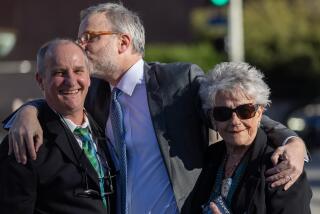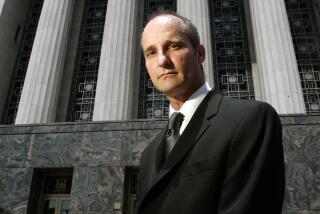Court Is Urged to OK Testimony to Leniency Plea
- Share via
DENVER — A federal prosecutor on Friday asked an appeals court to declare legal the practice of offering leniency to witnesses in exchange for testimony, saying many laws would be unenforceable without such deals.
In a 28-page brief filed with the U.S. 10th Circuit Court of Appeals, prosecutor Sean Connelly also outlined the legal history he believes supports such agreements.
“The United States relies on witnesses who testify in return for leniency in literally thousands of cases each year, including major cases, such as the Oklahoma City bombing prosecutions,” Connelly stated.
“Without such testimony, the government could not enforce the drug laws, could not prosecute organized crime figures . . . and could not prosecute many other cases.”
A three-judge circuit panel deemed the practice illegal, declaring it is tantamount to buying testimony. The 12-member appeals court later vacated the panel’s ruling and set a November hearing on the issue.
Prosecutors routinely offer immunity or reduced-charge plea agreements to defendants who testify against co-defendants.
The three-judge panel’s decision was handed down this month in an appeal filed by a Kansas woman who was convicted in a drug case based largely on the testimony of a co-conspirator.
In exchange, prosecutors promised they would not try the co-conspirator for other offenses and would tell the sentencing judge about his cooperation.
Connelly noted Congress has enacted numerous laws that authorize witness agreements.
He also identified rulings in the U.S. Supreme Court and other circuit appeals courts that support the practice, including the Whiskey Cases of 1878.
In that case, the Supreme Court referred to the “ancient doctrine of approvement,” which entitled capital defendants to an executive pardon if their testimony resulted in the conviction of another defendant, Connelly said.
In the 10 days the three-judge panel’s ruling was in effect, Connelly said, the decision “caused chaos in district courts and U.S. attorney’s offices.”
Attorneys had said the issue could affect the appeal of Oklahoma City bomber Timothy J. McVeigh because key government witness Michael Fortier testified after making a deal with prosecutors. But the appeals court said McVeigh could not add that argument to his appeal. McVeigh is awaiting execution for the 1995 bombing that killed 168 people.
More to Read
Sign up for Essential California
The most important California stories and recommendations in your inbox every morning.
You may occasionally receive promotional content from the Los Angeles Times.













